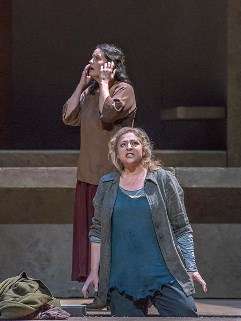|
Back
Goerke Triumphs in Elektra New York
Metropolitan Opera
03/01/2018 - & March 5, 9, 12, 17, 23, 2018
Richard Strauss: Elektra, opus 58
Christine Goerke (Elektra), Michaela Schuster (Klytämnestra), Elza van den Heever*/Allison Oakes (Chrysothemis), Mikhail Petrenko*/Dwayne Croft (Orest), Jay Hunter Morris (Aegisth), Kevin Short (Orest’s Guardian), Scott Scully (A Young Servant), James Courtney (Old Servant), Susan Neves (Overseer), Tichina Vaughn (First Maid), Maya Lahyani (Second Maid), Andrea Hill (Third Maid), Kelly Cae Hogan (Fourth Maid), Lisa Gwyn Daltirus (Fifth Maid)
The Metropolitan Opera Chorus, Donald Palumbo (chorus master), The Metropolitan Opera Orchestra, Yannick Nézet-Séguin*/Paul Nadler (conductor)
Patrice Chéreau (production), Richard Peduzzi (sets), Caroline de Vivaise (costumes), Dominique Bruguière (lights)

E. van den Heever, C. Goerke (© Karen Almond)
Since her stunning performance of the title role in Richard Strauss’s Elektra with the Boston Symphony on tour here in New York in 2015, Christine Goerke has become practically synonymous with the part. Triumphant productions in San Francisco and Houston earlier this season anticipated her first Met performances, which continue through March 23. To say that she “owns the role” is something of an understatement. The voice’s dramatic power sometimes faced fierce competition from the orchestra, but the study revealed great subtlety and an appealing coolness of tone. Goerke went in for the girlish qualities inherent in the role’s father-worship, but by the time Elektra meditates on where the music of the opera comes from – herself – and on the potentially destructive nature of love, she seemed more like an angst ridden teen finally ready to embrace nihilism.
It was probably a mistake to leave Elektra alive at the end. Who can doubt that, as a woman without a past or a future, there can be no further place for her in the present? The late Patrice Chéreau, whose production entered the Met repertoire in 2016, tended to be a contrarian for the sake of contrariness, and this production, widely shared with other theaters around the world, all too often articulates no discernible alternative perspective. The murders of Klytämnestra and Aegisth, Elektra’s homicidal mother and stepfather, happen on stage, diverting all attention away from the central character and her much more interesting emotive reactions. Indeed, Goerke stands with her back to the audience as Orest stabs their mother to death, depriving us of any impression the seminal dramatic effect. In another let down, Orest’s guardian, capably sung by Kevin Short, kills Aegisth, whose own reaction to the lifeless Klytämnestra mistakenly seizes our attention. It did not help that Richard Peduzzi’s sets confine the action to a beige archway that reminds one too keenly of the Met’s discarded production of Puccini’s Tosca by the equally dead Luc Bondy. Caroline de Vivaise’s dowdy 1950s vintage costumes made the banal suggestion that Elektra is a bourgeois domestic tragedy, but this only helps vitiate the work’s striking psychic dimensions. These failings seemed all the more odd since the production team did repeat its innovative feat, seen in its earlier production of Leos Janácek’s From the House of the Dead, of projecting the subtitles onto the stage itself in order to concentrate attention directly to the drama and away from the house’s seatback titles system.
Goerke’s splendid performance was newsworthy enough, but despite the stale sets, most of the remaining members of the House of Atreus demanded equal acclaim. In the role of Elektra’s tormented mother Klytämnestra, an adulterous murderess haunted by nightmares, the accomplished German mezzo Michaela Schuster made a splendid house debut. A renowned Strauss singer throughout Europe, she endowed the role with an unusual and carefully studied vulnerability. We are not meant to sympathize with Klytämnestra, but Schuster added colors of regret and pathos also visible in her recent portrayals of Herodias in Strauss’s Salome. Elza van den Heever’s Chrysothemis captured the role with an alluring innocence that detracted in no way from this talented soprano’s vocal prowess. Mikhail Petrenko sang a sturdy Orest. It was a bit cliché for Jay Hunter Morris to follow the well trodden path of Heldentenors from leading Wagner roles to unsympathetic parts like Aegisth (and his Straussian counterpart, Herod in Salome), and even here the voice showed unfortunate signs of decline.
Yannick Nézet-Séguin, who will become the Met’s music director next season, is working hard these days, leading Elektra on the heels of a demanding run of Richard Wagner’s Parsifal. Indeed, the two works were so closely timed that the Elektra rehearsals briefly became his morning exercise before moving on to six hours of Wagner in the evening. Strauss’s score emerged with grace and polish under his baton, though early in the evening the tempo felt a bit too slow to keep the drama moving, while the volume threatened at times to overwhelm the singers. Still, the orchestral mastery at work under his baton never slackened interest, and New York should look forward to many years of superb conducting in the late German Romantic repertoire.
Paul du Quenoy
|